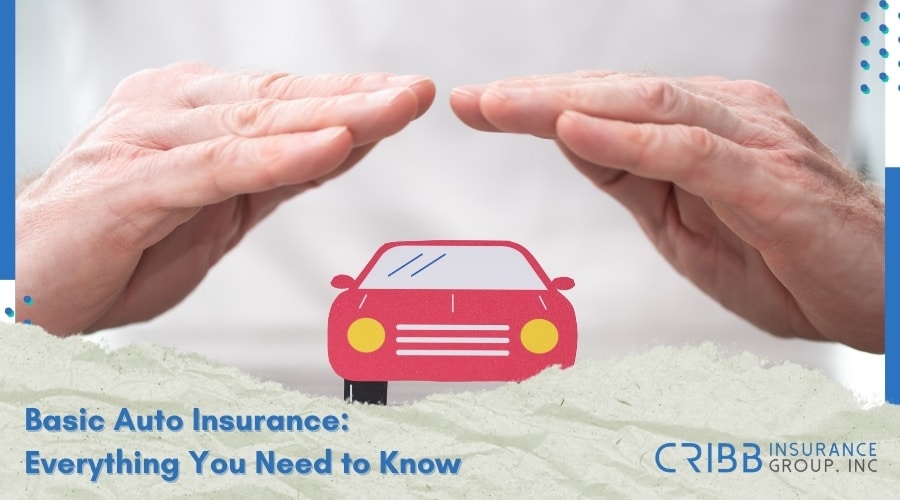Basic auto insurance is a crucial aspect of responsible car ownership. It provides a safety net for drivers, ensuring that they have financial protection in case of accidents or other unforeseen events on the road. This guide aims to shed light on the essentials of basic auto insurance, from understanding its importance to selecting the right policy for your needs.
In this guide, we’ll cover the key components of basic auto insurance, the various types of coverage available, and how to navigate state minimum requirements. We’ll also explore additional coverage options, factors affecting insurance rates, and tips for choosing the right policy. By the end of this guide, you’ll have a comprehensive understanding of basic auto insurance and how it can safeguard you and your vehicle.
What is Basic Auto Insurance?
Basic auto insurance is the foundation of protection for car owners. It’s designed to meet legal requirements and provide essential coverage in case of accidents. This section will define basic auto insurance and discuss its key components.
Defining Basic Auto Insurance
Basic auto insurance is a contract between a car owner and an insurance company. In exchange for paying a premium, the insurance company agrees to cover certain financial losses that may occur due to car accidents or other covered events. This type of insurance is mandatory in most states, ensuring that drivers have a minimum level of financial protection on the road.
Key Components of Basic Coverage
The key components of basic auto insurance typically include liability coverage and, in some cases, personal injury protection (PIP) or medical payment coverage. Liability coverage is essential as it covers expenses related to injuries or damages you may cause to others in an accident. It’s divided into two main categories: bodily injury liability and property damage liability. PIP or medical payments coverage, helps cover medical expenses for you and your passengers, regardless of who is at fault in an accident. These components form the core of basic auto insurance, providing crucial protection for drivers.
Types of Coverage in Basic Auto Insurance
Basic auto insurance is designed to provide essential protection for drivers, but it’s important to understand the different types of coverage available. Each type addresses specific risks and scenarios, offering varying levels of financial security. Let’s delve into the key types of coverage that constitute basic auto insurance.
Liability Coverage: Bodily Injury and Property Damage
Liability coverage is the cornerstone of basic auto insurance. It’s required by law in most states and serves two main purposes: bodily injury liability and property damage liability.
Bodily injury liability coverage helps pay for the medical expenses, lost wages, and legal fees of other people involved in an accident where you’re at fault. This coverage is crucial because it protects you from financial ruin if you’re sued for damages. The coverage limits, usually expressed as two numbers, represent the maximum amount your insurer will pay per person and accident for injuries you cause.
Property damage liability, on the other hand, covers the costs of repairing or replacing someone else’s property that you damaged in an accident. This can include their vehicle, fence, or even a building. Like bodily injury liability, property damage liability shields you from out-of-pocket expenses and potential lawsuits resulting from an accident.
It’s important to note that liability coverage does not cover your injuries or damage to your vehicle. For that, you’ll need additional coverage options, which we’ll explore in the following sections.
Uninsured and Underinsured Motorist Coverage
Uninsured and underinsured motorist coverage is essential for protecting yourself in case you’re in an accident with a driver who either lacks insurance or doesn’t have enough to cover the damages. Uninsured motorist coverage kicks in if the other driver has no insurance, helping you cover medical expenses and, in some cases, vehicle repairs. Underinsured motorist coverage is useful when the other driver’s insurance is insufficient to cover your losses. This coverage ensures that you’re not left paying out of pocket for an accident you didn’t cause.
Personal Injury Protection (PIP) and Medical Payments
Personal Injury Protection (PIP) and medical payments coverage provide financial support for medical expenses following an accident, regardless of who is at fault. PIP, often mandatory in no-fault states, covers medical expenses, lost wages, and sometimes funeral costs. Medical payment coverage, on the other hand, specifically addresses medical and funeral expenses for you and your passengers. Both coverages are designed to ensure that you receive the necessary medical attention without worrying about immediate costs.
Understanding State Minimum Requirements
State minimum requirements play a crucial role in determining the basic level of auto insurance you need to carry. These laws ensure that all drivers have a minimum level of financial protection in case of accidents. Understanding these requirements is essential for staying compliant with the law and ensuring you’re adequately protected.
Why State Minimums Matter
State minimums matter because they set the baseline for auto insurance coverage. These laws are designed to ensure that all drivers have enough insurance to cover damages or injuries they may cause in an accident. Without meeting these minimums, you risk legal penalties, such as fines or license suspension, and financial exposure if you’re involved in an accident.
How to Find Your State’s Requirements
Finding your state’s minimum auto insurance requirements is relatively straightforward. Here are some steps you can follow:
- Visit your state’s Department of Insurance website: Most states have an official website where you can find information about auto insurance requirements.
- Check with your insurance agent: An experienced insurance agent can provide you with up-to-date information about your state’s requirements.
- Look at your current policy: If you already have auto insurance, your policy documents should list the coverages that meet your state’s minimum requirements.
Additional Coverage Options
While basic auto insurance provides essential protection, you may want to consider additional coverage options for more comprehensive coverage. These options can help you tailor your policy to your specific needs and provide peace of mind in various situations.
Comprehensive and Collision Insurance
Comprehensive and collision insurance are two popular options that offer extended protection for your vehicle:
- Comprehensive Insurance: This coverage protects your car from non-collision events, such as theft, vandalism, fire, natural disasters, and hitting an animal. It’s especially useful if you live in an area prone to extreme weather or high crime rates.
- Collision Insurance: Collision coverage pays for repairs to your car if you’re involved in a collision with another vehicle or object, regardless of who is at fault. It’s valuable if you have a newer or more expensive car that would be costly to repair.
Roadside Assistance and Rental Reimbursement
In addition to comprehensive and collision insurance, other coverage options can enhance your policy:
- Roadside Assistance: This coverage provides help if your car breaks down due to mechanical or electrical issues, a flat tire, a dead battery, or if you run out of gas. It typically includes towing, jump-starts, tire changes, fuel delivery, and lockout services.
- Rental Reimbursement: If your car is in the shop for covered repairs after an accident, rental reimbursement coverage helps pay for a rental car. This ensures you have transportation while your vehicle is being fixed.
Customizing Your Policy with Add-ons
Customizing your auto insurance policy with add-ons allows you to tailor your coverage to your specific needs:
- Accident Forgiveness: Some insurers offer accident forgiveness, which means your rates won’t increase after your first at-fault accident.
- Gap Insurance: If you have a loan or lease on your car, gap insurance covers the difference between what you owe and the car’s actual cash value if it’s totaled.
- New Car Replacement: If your new car is totaled, this coverage helps you replace it with a new one of the same make and model.
- Rideshare Coverage: If you drive for a rideshare company like Uber or Lyft, this add-on provides coverage while you’re working.
Factors Affecting Auto Insurance Rates
Several factors can influence the cost of your auto insurance premiums. Understanding these factors can help you make informed decisions about your coverage and potentially lower your insurance costs.
How Insurers Determine Premiums
Insurance companies consider a variety of factors to determine your premiums:
- Driving Record: A clean driving record can lead to lower premiums, while accidents and traffic violations can increase your rates.
- Age and Gender: Younger drivers, especially males, tend to have higher premiums due to their higher risk of accidents.
- Vehicle Type: The make, model, and age of your car can impact your rates. Luxury and sports cars typically cost more to insure.
- Location: Where you live and park your car can affect your premiums. Urban areas with higher crime rates often have higher insurance costs.
- Credit Score: In some states, insurers use your credit score to help determine your rates. A higher score can lead to lower premiums.
- Coverage Amount: The more coverage you choose, the higher your premiums will be. Opting for higher deductibles can help reduce your rates.
Tips for Lowering Your Insurance Costs
There are several strategies you can employ to reduce your auto insurance premiums:
- Shop Around: Compare quotes from different insurance companies to find the best rates.
- Bundle Policies: Consider bundling your auto insurance with other policies, such as homeowners or renters insurance, for a discount.
- Increase Deductibles: Opting for higher deductibles can lower your premium, but make sure you can afford the out-of-pocket cost in case of a claim.
- Take Advantage of Discounts: Many insurers offer discounts for safe driving, anti-theft devices, good grades (for students), and more.
- Drive Safely: Maintaining a clean driving record can qualify you for lower rates and safe driver discounts.
- Consider Usage-Based Insurance: Some insurers offer usage-based insurance programs that track your driving habits and offer discounts for safe driving.
- Review Your Coverage Regularly: Make sure your coverage fits your current needs and adjust it as necessary to avoid paying for unnecessary coverage.
How to Choose the Right Basic Auto Insurance Policy
Choosing the right auto insurance policy can be daunting, but it’s essential to ensure you have adequate protection. Here are some tips to help you select the best policy for your needs.
Assessing Your Coverage Needs
To choose the right auto insurance policy, start by assessing your coverage needs:
- Consider Your Vehicle: If you have a newer or more expensive car, you might want more comprehensive coverage to protect your investment.
- Evaluate Your Financial Situation: Consider how much you can afford to pay out of pocket in case of an accident. This can help you decide on your deductible and coverage limits.
- Think About Your Driving Habits: If you drive frequently or have a long commute, you might need more coverage than someone who uses their car less often.
- Review State Requirements: Make sure your policy meets your state’s minimum coverage requirements.
- Consider Additional Protections: Depending on your circumstances, you might want to add optional coverages like roadside assistance or gap insurance.
Comparing Quotes and Policies
Once you’ve assessed your coverage needs, it’s time to compare quotes and policies:
- Get Multiple Quotes: Obtain quotes from several insurance companies to compare prices and coverage options.
- Compare Coverage Options: Look beyond the price and compare the coverage details, including deductibles, limits, and exclusions.
- Check the Insurer’s Reputation: Research the insurance company’s customer service, claim handling, and financial stability.
- Consider Discounts: Ask about available discounts and see which ones you qualify for to reduce your premium.
- Read Reviews: Look for customer reviews and ratings to gauge the insurer’s reliability and customer satisfaction.
Understanding Policy Terms and Conditions
Understanding the terms and conditions of your auto insurance policy is crucial:
- Review the Declaration Page: This page summarizes your coverage, including the types and limits of coverage, deductibles, and the policy period.
- Understand the Exclusions: Be aware of what is not covered by your policy to avoid surprises in case of a claim.
- Know Your Deductibles: Understand how much you’ll need to pay out of pocket before your insurance coverage kicks in.
- Familiarize Yourself with the Claims Process: Know how to file a claim and what information you’ll need to provide.
- Ask Questions: If there’s anything in your policy that you don’t understand, don’t hesitate to ask your insurance agent for clarification.
Conclusion
Basic auto insurance is a crucial aspect of responsible driving. It not only fulfills legal requirements but also provides financial protection in the event of accidents or unexpected incidents. As you navigate the world of auto insurance, it’s essential to understand the different types of coverage available, assess your needs, and choose a policy that offers the right balance of protection and affordability.
At Cribb Insurance Group Inc in Bentonville, AR, we’re here to help you make informed decisions about your auto insurance and ensure that you’re adequately covered. Remember to review and update your coverage regularly to keep pace with changes in your life and driving habits.
Frequently Asked Questions
Can I switch auto insurance providers mid-policy?
Yes, you can switch auto insurance providers mid-policy. However, it’s important to ensure there are no penalties for canceling your current policy early and that you have a new policy in place before canceling to avoid any gaps in coverage.
What is a deductible in auto insurance?
A deductible is the amount you agree to pay out of pocket before your insurance coverage kicks in for a claim. Choosing a higher deductible can lower your premium, but it means you’ll pay more upfront in the event of an accident.
How do traffic violations affect my auto insurance rates?
Traffic violations, such as speeding tickets or DUIs, can significantly increase your auto insurance rates. Insurers view drivers with violations as higher risk, which leads to higher premiums.
What is the difference between collision coverage and comprehensive coverage?
Collision coverage pays for damages to your vehicle resulting from a collision with another vehicle or object. Comprehensive coverage, on the other hand, covers non-collision events like theft, vandalism, or natural disasters.
Can I get auto insurance with a poor driving record?
Yes, you can get auto insurance with a poor driving record, but it may be more expensive. Some insurers specialize in high-risk drivers, so it’s worth shopping around to find the best rates and coverage for your situation.
Ready to Secure Your Peace of Mind on the Road?
Don’t wait until it’s too late. Take the first step towards comprehensive protection and financial security. Contact Cribb Insurance Group Inc in Bentonville, AR, today to find the perfect auto insurance policy tailored to your needs. Drive with confidence, knowing you’re covered by a policy that has your back in every situation. Call us now or visit our website to get started on your journey to a safer and more secure driving experience.




